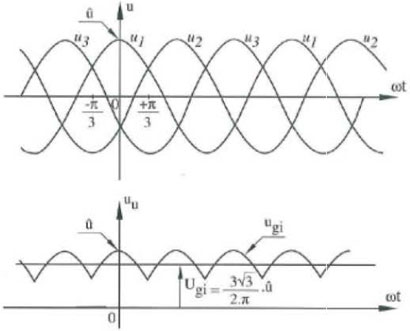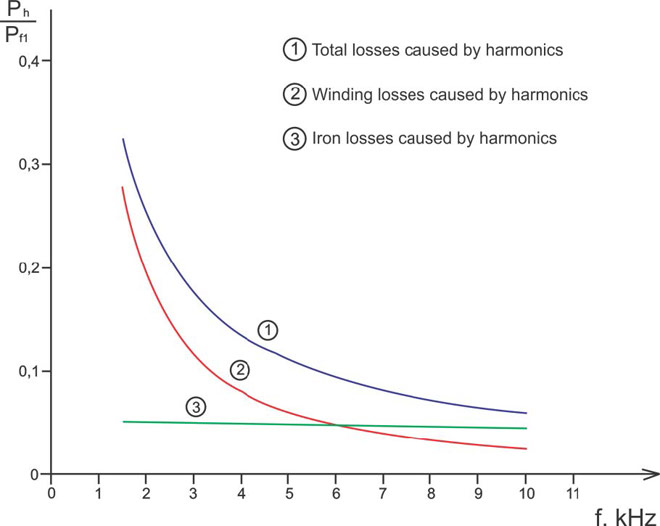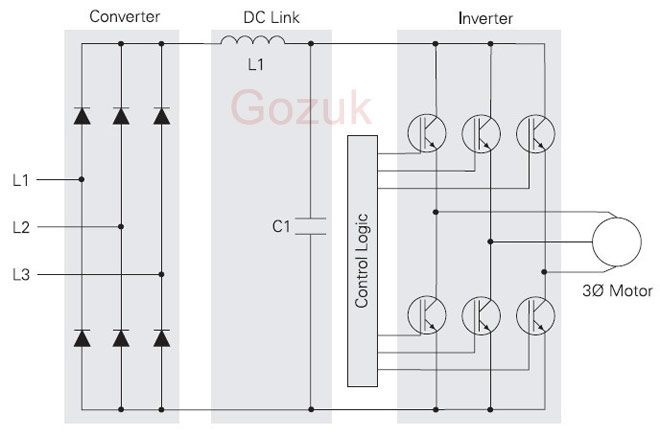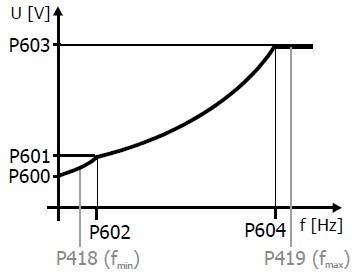VFD payback calculation
The use of VFDs on variable torque loads for the purpose of gaining energy savings is a common application. Calculation or estimation of energy savings is needed to justify expenditures for the VFDs.
Significant energy savings can be achieved in a fan system by reducing the fan rotational speed. variable frequency drive is one of the primary devices used to control fan rotational speed. A variable frequency drive is a device that controls the rotational speed of motor-driven equipment (what is a VFD?). The variable frequency drives efficiently meet varying process requirements by adjusting the frequency and voltage of the power supplied to an AC motor to enable it to operate over a wide speed range. External sensors monitor flow and/or pressure and then transmit a signal to a controller that adjusts the frequency and speed to match process requirements.
Follow the instructions to determine payback on your fan system:
1. Pick your existing system and calculate your savings index based on the hours/year for the required flow range.
HRS A: hours/year at 0 - 60 % Flow
HRS B: hours/year at 60 - 80 % Flow
HRS C: hours/year at 80 - 100 % Flow
2. Calculate savings/year using this formula:
0.746 x (HP) x ($/KWH) x (saving index) x ($/Yr.savings)
3. Estimate Costs
Equipment: VFD, Meters etc ____
VFD system installation: estimate 8 man hours ____
Consultation Fee: ____
Total Cost = ____
4. Calculate Payback
(Total Cost) ÷ ($/Yr. Savings) = (Years)

An existing variable air volume system uses dampers to regulate flow. The fan HP has been determined to be 20 HP and cost of electricity (including demand charges) is low 5c/KWH. The building is in operation 10 hours per day, 300 days per year, and the duty cycle is as described in following Figure.
1. The savings index = 1.00 (1500) + 0.80 (1200) + 0.55 (300) = 2,625
2. Savings/Year = 0.746 (20) (0.05) (2625) = $1,958.25
Costs were as follows:
Equipment less 10% $3,500.00
VFD installation 250.00
Engineering 000.00
Total Cost $3,750.00
Payback = $3,750 ÷ $1,958 = 1.9 years
This calculation allows potential variable frequency drive specifiers to make an informed decision before purchasing a variable frequency drive for their fan application. The calculator is intended as a first-pass indication tool to make a decision about whether a variable frequency drive will bring energy savings to a fan application.
Significant energy savings can be achieved in a fan system by reducing the fan rotational speed. variable frequency drive is one of the primary devices used to control fan rotational speed. A variable frequency drive is a device that controls the rotational speed of motor-driven equipment (what is a VFD?). The variable frequency drives efficiently meet varying process requirements by adjusting the frequency and voltage of the power supplied to an AC motor to enable it to operate over a wide speed range. External sensors monitor flow and/or pressure and then transmit a signal to a controller that adjusts the frequency and speed to match process requirements.
Follow the instructions to determine payback on your fan system:
1. Pick your existing system and calculate your savings index based on the hours/year for the required flow range.
HRS A: hours/year at 0 - 60 % Flow
HRS B: hours/year at 60 - 80 % Flow
HRS C: hours/year at 80 - 100 % Flow
|
Constant volume
 1.30 x HRS A = ____ 1.00 x HRS B = ____ 0.60 x HRS C = ____ TOTAL saving index = ____ |
Variable volume - Damper
 1.00 x HRS A = ____ 0.80 x HRS B = ____ 0.55 x HRS C = ____ TOTAL saving index = ____ |
Variable volume - Vane
 0.65 x HRS A = ____ 0.55 x HRS B = ____ 0.35 x HRS C = ____ TOTAL saving index = ____ |
2. Calculate savings/year using this formula:
0.746 x (HP) x ($/KWH) x (saving index) x ($/Yr.savings)
3. Estimate Costs
Equipment: VFD, Meters etc ____
VFD system installation: estimate 8 man hours ____
Consultation Fee: ____
Total Cost = ____
4. Calculate Payback
(Total Cost) ÷ ($/Yr. Savings) = (Years)
VFD Energy saving calculation case

An existing variable air volume system uses dampers to regulate flow. The fan HP has been determined to be 20 HP and cost of electricity (including demand charges) is low 5c/KWH. The building is in operation 10 hours per day, 300 days per year, and the duty cycle is as described in following Figure.
1. The savings index = 1.00 (1500) + 0.80 (1200) + 0.55 (300) = 2,625
2. Savings/Year = 0.746 (20) (0.05) (2625) = $1,958.25
Costs were as follows:
Equipment less 10% $3,500.00
VFD installation 250.00
Engineering 000.00
Total Cost $3,750.00
Payback = $3,750 ÷ $1,958 = 1.9 years
This calculation allows potential variable frequency drive specifiers to make an informed decision before purchasing a variable frequency drive for their fan application. The calculator is intended as a first-pass indication tool to make a decision about whether a variable frequency drive will bring energy savings to a fan application.
Post a Comment:
You may also like:
Featured Articles
Variable frequency drive Rectifier
 To understand variable frequency drive (VFD) better, it's necessary to explain some of the main parts of the variable frequency ...
To understand variable frequency drive (VFD) better, it's necessary to explain some of the main parts of the variable frequency ...
 To understand variable frequency drive (VFD) better, it's necessary to explain some of the main parts of the variable frequency ...
To understand variable frequency drive (VFD) better, it's necessary to explain some of the main parts of the variable frequency ...VFD controlled Induction motor ...
 This paper presents a procedure to measure the efficiency on an induction motor fed by a VFD by the all operation range to speed ...
This paper presents a procedure to measure the efficiency on an induction motor fed by a VFD by the all operation range to speed ...
 This paper presents a procedure to measure the efficiency on an induction motor fed by a VFD by the all operation range to speed ...
This paper presents a procedure to measure the efficiency on an induction motor fed by a VFD by the all operation range to speed ...VFD: Pulse Width Modulation (PWM)
 Pulse Width Modulation (PWM) VFDs provide a more sinusoidal current output to control frequency and voltage supplied to an AC ...
Pulse Width Modulation (PWM) VFDs provide a more sinusoidal current output to control frequency and voltage supplied to an AC ...
 Pulse Width Modulation (PWM) VFDs provide a more sinusoidal current output to control frequency and voltage supplied to an AC ...
Pulse Width Modulation (PWM) VFDs provide a more sinusoidal current output to control frequency and voltage supplied to an AC ...Variable frequency drive Advantages & ...
VFDs are good for variable speed, in a water pump this is used to maintain a steady pressure, they will smooth out variances in ...
Variable frequency drive Energy saving
 Energy can be saved in a VFD by reducing the losses in the electric motor or by reducing the energy consumption of the variable ...
Energy can be saved in a VFD by reducing the losses in the electric motor or by reducing the energy consumption of the variable ...
 Energy can be saved in a VFD by reducing the losses in the electric motor or by reducing the energy consumption of the variable ...
Energy can be saved in a VFD by reducing the losses in the electric motor or by reducing the energy consumption of the variable ...
VFD manufacturers
